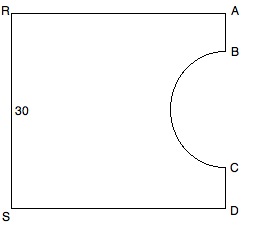All High School Math Resources
Example Questions
Example Question #1 : Circles
A circular, 8-slice pizza is placed in a square box that has dimensions four inches larger than the diameter of the pizza. If the box covers a surface area of 256 in2, what is the surface area of one piece of pizza?
144π in2
4.5π in2
9π in2
18π in2
36π in2
4.5π in2
The first thing to do is calculate the dimensions of the pizza box. Based on our data, we know 256 = s2. Solving for s (by taking the square root of both sides), we get 16 = s (or s = 16).
Now, we know that the diameter of the pizza is four inches less than 16 inches. That is, it is 12 inches. Be careful! The area of the circle is given in terms of radius, which is half the diameter, or 6 inches. Therefore, the area of the pizza is π * 62 = 36π in2. If the pizza is 8-slices, one slice is equal to 1/8 of the total pizza or (36π)/8 = 4.5π in2.
Example Question #1 : Sectors

If B is a circle with line AC = 12 and line BC = 16, then what is the area formed by DBE?
Line AB is a radius of Circle B, which can be found using the Pythagorean Theorem:
Since AB is a radius of B, we can find the area of circle B via:
Angle DBE is a right angle, and therefore 

Example Question #4 : Circles
To the nearest tenth, give the area of a 
The radius of a circle with diameter 18 centimeters is half that, or 9 centimeters. The area of a 
Example Question #5 : Circles
Find the area of a sector that has an angle of 120 degrees and radius of 3.

The equation to find the area of a sector is 
Substitute the given radius in for 

Simplify the equation to get the area:

Example Question #2 : Circles
What is the area of the following sector of a full circle?

Note: Figure is not drawn to scale.
In order to find the fraction of a sector from an angle, you need to know that a full circle is 
Therefore, we can find the fraction by dividing the angle of the sector by 
The formula to find the area of a sector is:
where 
Plugging in our values, we get:
Example Question #11 : Sectors
Find the area of the shaded region:

To find the area of the shaded region, you must subtract the area of the triangle from the area of the sector.
The formula for the shaded area is:

where 



In order to the find the base and height of the triangle, use the formula for a 



Plugging in our final values, we get:
Example Question #11 : Sectors
Find the area of the following sector:

The formula for the area of a sector is

where 

Plugging in our values, we get:
Example Question #1 : How To Find The Area Of A Sector

The radius of the circle above is 

Area of Circle = πr2 = π42 = 16π
Total degrees in a circle = 360
Therefore 45 degree slice = 45/360 fraction of circle = 1/8
Shaded Area = 1/8 * Total Area = 1/8 * 16π = 2π
Example Question #11 : Circles
Find the area of the shaded segment of the circle. The right angle rests at the center of the circle.
We know that the right angle rests at the center of the circle; thus, the sides of the triangle represent the radius of the circle.
Because the sector of the circle is defined by a right triangle, the region corresponds to one-fourth of the circle.
First, find the total area of the circle and divide it by four to find the area of the depicted sector.
Next, calculate the area of the triangle.
Finally, subtract the area of the triangle from the area of the sector.
Example Question #1 : How To Find The Area Of A Sector


The arc from 


All units are in feet.
The diagram shows a plot of land.
The cost of summer upkeep is $2.50 per square foot.
In dollars, what is the total upkeep cost for the summer?
To solve this, we must begin by finding the area of the diagram, which is the area of the square less the area of the semicircle.
The area of the square is straightforward:
30 * 30 = 900 square feet
Because each side is 30 feet long, AB + BC + CD = 30.
We can substitute BC for AB and CD since all three lengths are the same:
BC + BC + BC = 30
3BC = 30
BC = 10
Therefore the diameter of the semicircle is 10 feet, so the radius is 5 feet.
The area of the semi-circle is half the area of a circle with radius 5. The area of the full circle is 52π = 25π, so the area of the semi-circle is half of that, or 12.5π.
The total area of the plot is the square less the semicircle: 900 - 12.5π square feet
The cost of upkeep is therefore 2.5 * (900 – 12.5π) = $(2250 – 31.25π).
Certified Tutor
Certified Tutor
All High School Math Resources







































































